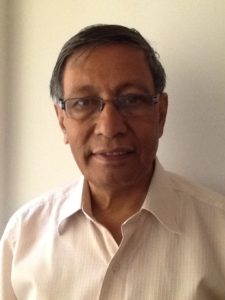
Prof Lawrence Jenkins was Chairman of the Bangalore Section of IEEE during the years 1992, 1996 and 1997. He earned his BTech from the Indian Institute of Technology, Madras and MS and PhD degrees from the University of Notre Dame USA. He spent most of his career as a faculty member of the Department of Electrical Engineering at the Indian Institute of Science. He also had visiting appointments at Purdue University, USA, the National University of Singapore, the National Institute of Technology, Goa and the Central Power Research Institute. He has served on the Boards of Governors at the Siddaganga Institute of Technology, Tumkur and at the BMS College of Engineering, Bangalore. He also served on the Boards of Studies at a number of institutions in Karnataka and Tamilnadu.
Prior to serving as Chairman of the IEEE Bangalore Section, he had terms as Student Counsellor, Secretary and Vice-Chairman. He was awarded an IEEE Millennium medal in 2000. He also served for two year as President of the Advanced Computing and Communication Society.
Prof Jenkins has guided and carried our research in the areas of Real-time Systems, Sensor Networks and the application of Optimization Techniques to Power Systems. He has guided 12 doctoral theses and has published 150 research papers in journals and in conference proceedings. He is the author of the book “Digital Computer Principles” that was published by Wiley Eastern Publishers. He has offered a number of 1-day tutorials through the IEEE Bangalore Section and at the Indian Institute of Science. His current research interests are in Real Time Communication Protocols for Embedded Applications.
TENURE OF PROF LAWRENCE JENKINS
My first term as Chair was in 1992. It was a brief tenure, as I took over in April, and relinquished the post when I went on sabbatical to the National University of Singapore in June. The only event of significance was the inauguration of the student branch at the Sri Jayachamarajendra College of Engineering, which joined IISc as the second branch in the Section, and has been an outstanding and pioneering branch over the years.
I had my second stint during 1996 and 1997. Due to the efforts of previous EXCOMs, the Section already had a strong tradition of high quality technical programs and was financially healthy. But there were only two student branches, and the few existing society chapters were inactive. Hence the EXCOM had to run all technical activities on its own. Since the Computer Society had by far the most members, we were able reactivate its chapter. But we were short of active volunteers to run our technical programs. Apart from this lack of numbers, there was a disconnect between the EXCOM and the growing membership of the Section, since by tradition most of the former came from a few organizations like IISc, Kirloskar Electric, BHEL, ISRO and CPRI, which had been the mainstay of the Section in the early years, whereas the large growth in new members was from the computer and the communication companies.
I believe that my main contribution to the long-term health of the Section was the spontaneous call for volunteers that I made at the AGM. In response, four members came forward, and were immediately inducted into the 1997 EXCOM. One of them activated the Newsletter and subsequently became the Section Chair, while another also moved up as Chair and later was elected as Region 10 Director. To be frank, I never foresaw these consequences. Nor did I anticipate that my action would broad base the volunteer pool, and facilitate the rapid growth in society chapters and student branches. As a result of these developments, today’s EXCOM can concentrate on the leadership of the Section and on providing services and key technical activities, while the other entities can focus on the special needs of their own subsets of members. Due to this, we now have a very active Bangalore Section, with an outstanding range of activities.
SUGGESTIONS FOR NEW INITIATIVES
The Section is in the enviable position of having a large membership, a good volunteer base, a high level of technical and professional activities and a very healthy financial position. So there is no need for any radical changes in its operation. But one should continuously strive to respond to the changing needs of the membership. A significant number of our members are employed in the information technology and related sectors, which are facing challenging times, while the student members currently face a difficult job market. The Bangalore Section needs to have new activities that are relevant in this scenario.
The EXCOM should encourage the Society chapters to run workshops and tutorials on topics that would enable members to enhance their skill sets. In addition, one-hour technical talks and such programs would add to the technical activities as well as provide an opportunity to network. Student members have a range of needs; they require career advice and mentoring, an exposure to technical topics that goes beyond what is provided by the curriculum, and an opportunity to improve their communication skills. While the student branches have willing Counsellors and able volunteers, the EXCOM may find it useful to call upon some of our experienced members to assist them in identifying appropriate activities.